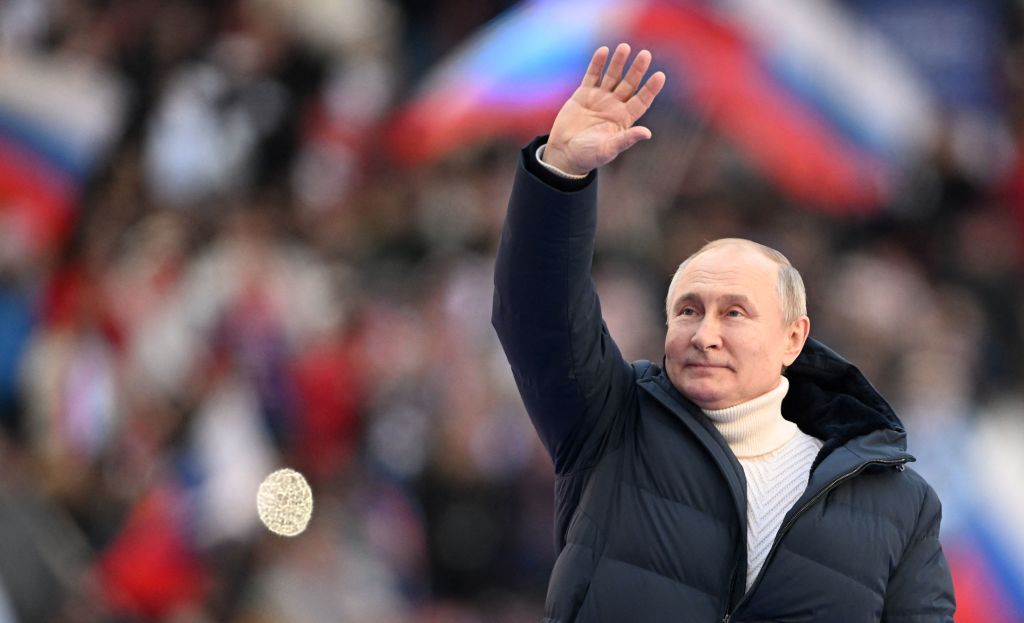
President Biden and senior U.S. officials have openly questioned Vladimir Putin’s leadership as Russia reels from economic sanctions and battlefield failures. Newly declassified U.S. intelligence has described Putin as increasingly isolated, unable to get accurate reports from the war in Ukraine, and frustrated with his military leaders.
Yet in briefings to President Biden, U.S. intelligence officials have said there are no signs that the fallout from the war has loosened Putin’s grip on Russia, according to two U.S. officials familiar with those assessments. In fact, experts say, there’s evidence that Putin has used the war to further consolidate power, at least in the short term.
As the war drags on, Putin has intensified his long-running battle to crack down on opposing voices within Russia. Putin signed into law a measure which effectively criminalizes independent reporting that deviates from the government line, even banning the use of the word “war” in news broadcasts about Ukraine, which led to the closure of independent Russian media outlets. Russian authorities have arrested thousands who spoke out against the invasion. The protests within Russia have been smaller during the war than the ones that broke out in 2018 over pension reforms, says a U.S. government official—a sign that the crackdown on domestic dissent has had a chilling effect.
U.S. intelligence officials have also assessed that Putin has thwarted the emergence of potential successors. The longevity of his reign is partially attributable to the absence of a clear No. 2 waiting in the wings, say experts, who point out there hasn’t been an organic succession of power in Russia since President Boris Yeltsin left office at the end of 1999.
Read More: Inside the Historic Mission to Provide Aid and Arms to Ukraine.
There are few mechanisms available within Russia to remove Putin from power. It seems “unrealistic” to expect Russian business elites to work together with the Russian military to remove Putin, says Rita Konaev, an expert on the Russian military at Georgetown University’s Center for Security and Emerging Technology. Civil society has been ground down by arrests, harassment and threats from the Kremlin. Reformists inside the government “don’t exist,” Konaev says.
More from TIME
Nor is Russia’s poor military performance in Ukraine guaranteed to weaken Putin’s standing. Military losses in Russia have rarely turned public opinion in the past, Konaev says, and can instead cause Russians to rally around the flag, particularly among families who have lost loved ones. “If anything,” Konaev says, “there’s quite often a higher rate of approval and support for wars among people who serve and the people who have military families, because there’s a sacrifice that has been made and people don’t want to believe that their sacrifices were for nothing.”
Read More: A Ukrainian Photographer Documents the Invasion of Kyiv.
Eugene Rumer, the director of the Russia and Eurasia Program at the Carnegie Endowment for International Peace and a former national intelligence officer for Russia and Eurasia at the U.S. National Intelligence Council, has seen signs that Putin has used the war and ensuing Western sanctions to strengthen his grip on power. “A lot of opposition figures have been pressed to leave the country” in the past few weeks, Rumer says, and “it has become even more difficult, if not impossible, for independent outlets to continue operating.”
Putin has worked for nearly a decade to “sanction proof” Russia, Rumer says, designating many civil-society organizations as foreign agents and implementing a new national security strategy last July designed to insulate Russia from external influences that would amplify criticism of him. In 2019, Russian authorities practiced cutting off the Russian Internet from the World Wide Web to test how a firewall around Russian Internet access would fare in a crisis. A Russian court this month banned Facebook and Instagram from the country in an effort to uphold a Putin-era law banning services that carry out “extremist activities.”
Read More: The Man On Ukraine’s Digital Frontline.
All this means that Biden’s recent off-the-cuff remarks that Putin “cannot remain in power” was more wishful thinking than a shift in U.S. policy or a reflection of any intelligence suggesting the Russian leader is facing mounting political peril. Biden’s remarks alarmed aides, who were concerned Putin would take them as a threat and escalate tensions between the two nuclear powers, says one official familiar with the discussions. Senior U.S. officials scrambled to explain to reporters and allies that U.S. policy had not changed, and Biden later clarified that his sentiments were an expression of the “moral outrage” he felt watching the death and destruction Putin’s military has brought on Ukraine.
U.S. officials are nonetheless working to ramp up the pressure on Putin, declassifying intelligence assessments this week about growing tensions between Putin and his Defense Minister, Sergei Shoigu, and other senior security officials, over how the war has been waged. Secretary of State Antony Blinken told reporters traveling with him in Algeria that Putin’s autocratic rule has made it harder for advisors to tell him uncomfortable truths, while White House Communications Director Kate Bedingfield called the Russian invasion a “strategic blunder.”
Yet experts who have seen autocrats move to solidify their power in the past say that there is still no sign Putin may be heading for the exits. If anything, the moves he’s making may augur the opposite.
More Must-Reads From TIME
- The 100 Most Influential People of 2024
- The Revolution of Yulia Navalnaya
- 6 Compliments That Land Every Time
- What's the Deal With the Bitcoin Halving?
- If You're Dating Right Now , You're Brave: Column
- The AI That Could Heal a Divided Internet
- Fallout Is a Brilliant Model for the Future of Video Game Adaptations
- Want Weekly Recs on What to Watch, Read, and More? Sign Up for Worth Your Time
Contact us at letters@time.com